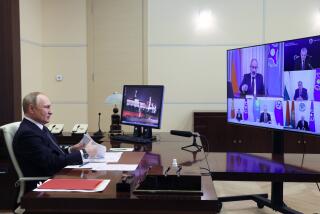Islands Dispute Stalls Japanese Reply to Yeltsin’s Offer to Visit
- Share via
TOKYO — Russian President Boris N. Yeltsin’s offer to visit Japan next month ran into a wall Thursday.
Foreign Minister Andrei V. Kozyrev, whom Yeltsin said he had instructed to firm up dates for the trip during his visit to Tokyo, spent nearly five hours meeting and dining with Japanese Foreign Minister Kabun Muto but came up empty-handed.
Kozyrev had no other meetings scheduled before his departure today.
A Japanese Foreign Ministry official, who took part in the talks but asked not to be identified, said the two countries will continue consultations about the trip. Not only the dates but also the “contents” of a Yeltsin visit will be discussed, the official said.
By “contents,” the official made clear he meant how Yeltsin proposes to deal with Japan’s demand that Moscow return four northern islands that it seized after World War II.
In a news conference after a two-day Russian aid conference of Group of Seven (G-7) foreign and finance ministers, Kozyrev told reporters that Russia has “a very positive feeling on the future of our relations with Japan, including that (the territorial) issue.”
In a TV interview, he declared that “the territorial problem will naturally be on the agenda” for a Yeltsin visit.
Yeltsin, who canceled a visit last September four days before he was to arrive because of the territorial issue, astonished Japan on Wednesday by announcing he is now ready to visit. He cited as his reason for the about-face what he called Prime Minister Kiichi Miyazawa’s agreement to separate Japan’s territorial demands from economic aid to Russia. But on Thursday, two Japanese officials contradicted Yeltsin’s interpretation.
Yohei Kono, chief Cabinet secretary, told a news conference that Yeltsin had misquoted Miyazawa. The prime minister did not separate the territorial issue from Japanese aid to Russia, Kono said. Rather, Miyazawa had said that Japan would not link the issue to its invitation to Yeltsin to attend the summit of the heads of government of the G-7 advanced industrial democracies in Tokyo in July.
Japan would expect a Yeltsin visit to Tokyo before the summit to be a “first step toward normalization of relations,” Kono said.
Muto told Kozyrev directly that Japan, in its bilateral ties with Russia, wants to expand both economic and political relations--including the territorial issue--simultaneously.
The implication was that Japan will put aside its territorial claims when dealing with Russia as a member of the G-7 but that, on a bilateral level, the demands stand.
More to Read
Sign up for Essential California
The most important California stories and recommendations in your inbox every morning.
You may occasionally receive promotional content from the Los Angeles Times.












